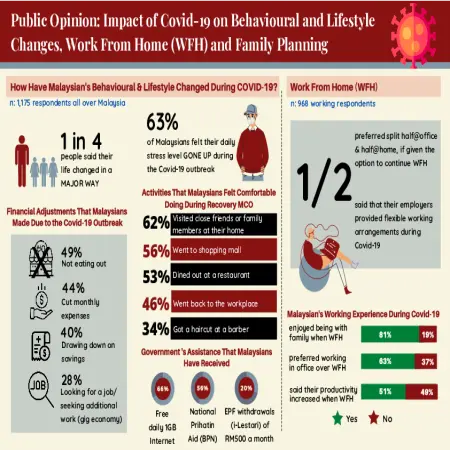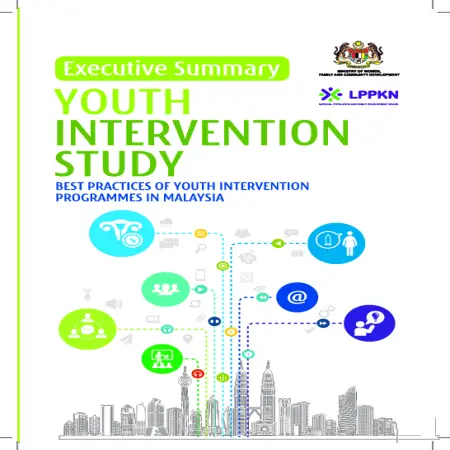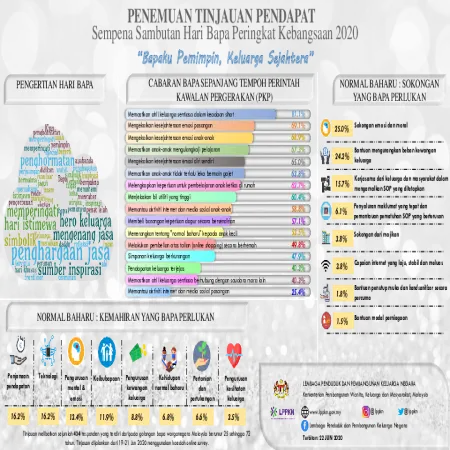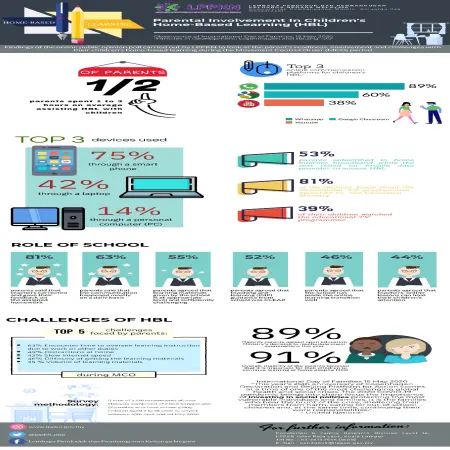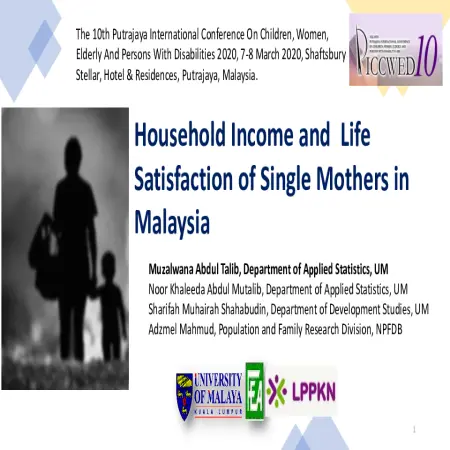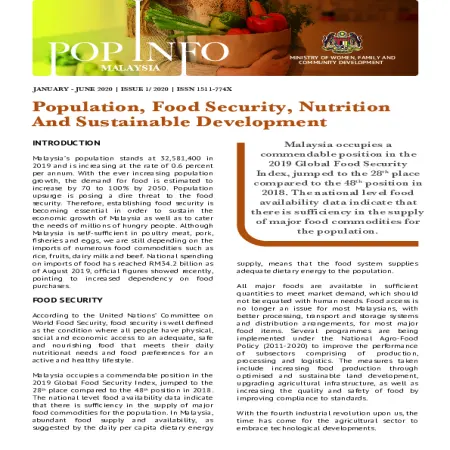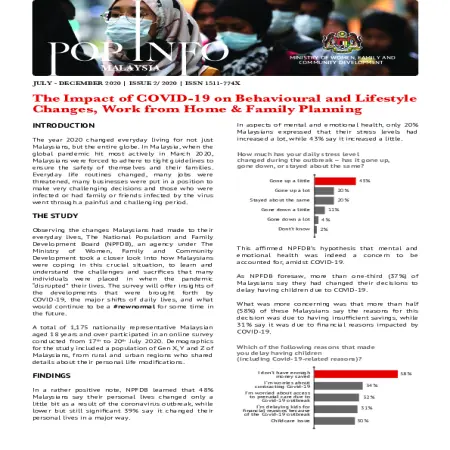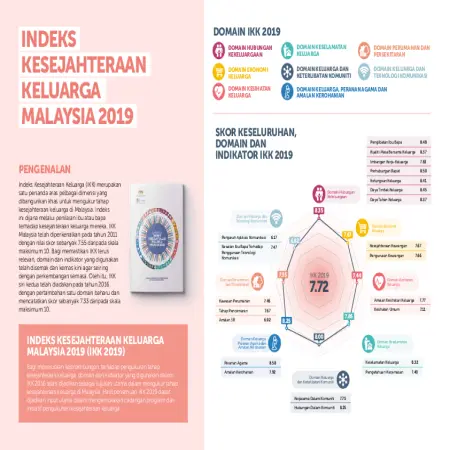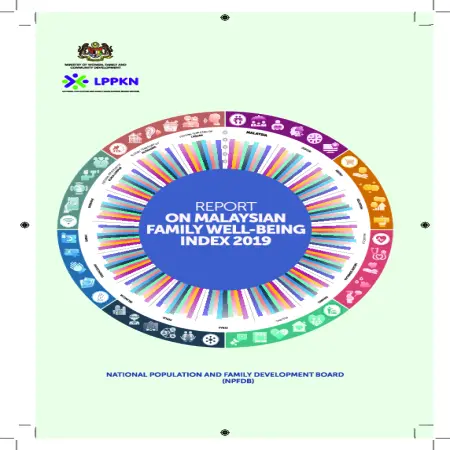Browse by Subject
Results for Search : "305 Social groups"
|
|
Public opinion: impact of covid-19 on behavioural and lifestyle changes, work from home (WFH) and family planning
Item Type: Infographic
Editor:
Year: 27/07/2020
Abstract: This infographic shows the findings from the study covered the below areas: changes in Malaysians’ personal lives, emotional health / stress levels observed during the pandemic, financial adjustments during and since the pandemic, benefits from employers during the pandemic, changes in working conditions, environment and styles and family planning amidst COVID-19.
|
|
|
|
|
|
Executive Summary: youth intervention study: best practices of youth intervention programmes in Malaysia
Item Type: Research Report
Editor:
Year: 01/07/2020
Abstract: In the decades, Malaysia has undergone rapid economic, social and cultural changes which impacted not only the daily lives of its people but also their worldview and values. This is particularly so for young people, as excessive exposure to information from the social media, internet and pornography had inevitably influence their lifestyle and behaviour. The socio-cultural changes are likely associated with an increased rates of non-marital sexual activity, increased rates of sex partner change and increased rates of sexually transmitted infections (STIs). In 2005, the Ministry of Women, Family and Community Development through NPFDB introduced the PEKERTI Programme to be implemented at KafeTEEN adolescents centres. The programme provides reproductive health services, counseling services and education and skill building to promote a healthy life and inculcate positive attitudes and moral values among young people.
|
|
|
|
|
|
Penemuan tinjauan pendapat sempena sambutan Hari Bapa Peringkat Kebangsaan 2020 "Bapaku Pemimpin, Keluarga Sejahtera"
Item Type: Infographic
Editor:
Year: 22/06/2020
Abstract: This infographic is about findings from public opinion: Bapaku Pemimpin, Keluarga Sejahtera. In observance of National Father's Day 2020.
|
|
|
|
|
|
Parental involvement in children's home-based learning (HBL)
Item Type: Infographic
Editor:
Year: 00/05/2020
Abstract: This infographic is about findings of the online public poll carried out by National Population and Family Development Board (NPFDB) to look at the parent’s readiness, involvement and challenges with their children’s home-based learning during the movement control order (MCO) period.
|
|
|
|
|
|
Household income and life satisfaction of single mothers in Malaysia
Item Type: Conference or Workshop Item
Editor:
Year: 00/03/2020
Abstract: This study attempts to explore the socio –demographic and economic background of single mothers in Malaysia and to examine their income category and level of poverty. This study utilizes the Fifth Malaysian Population Survey (MPFS5) data. However, for this study, the target respondents are working single mothers (either widowed, divorced, separated); aged 15- 59 years old; residing in Peninsular Malaysia and have children staying together with them. Findings from this study reveal that household income of single mothers falls under the B40 category but there is not enough evidence to claim that their household income is below the poverty line. Chi – Square test of associations prove relationships between poverty level to socio – demographic variables such as level of education and residential states, while PLS – SEM techniques show that income category of single mothers is somehow related to the predictors of life satisfaction construct and the overall life satisfaction. Single mothers are already facing limited job market and reduced salary with their low level of educational attainment. Therefore, some suggested policy recommendations are to protect and promote single mothers involved in elementary occupations and to create more quality jobs to develop these women from the existing low-paid of the informal into the formal sectors.
|
|
|
|
|
|
The Family Well-Being Index 2019
Item Type: Video
Editor:
Year: 00/00/2020
Abstract: A Short video on Family well-being index. The family well-being index (FWBI) is developed to measure the level of family well-being in the country. To continue monitoring the level of well-being of Malaysian families, the third series of FWBI was held in 2019 maintained all eight domains of FWBI 2016.
|
|
|
|
|
|
Population, food security, nutrition and sustainable development
Item Type: Newsletter
Editor:
Year: 00/00/2020
Abstract: Malaysia occupies a commendable position in the 2019 Global Food Security Index, jumped to the 28th place compared to the 48th position in 2018. The national level food availability data indicate that there is sufficiency in the supply of major food commodities for the population.
|
|
|
|
|
|
The impact of COVID-19 on behavioural and lifestyle changes, work from home & family planning
Item Type: Newsletter
Editor:
Year: 00/00/2020
Abstract: This survey will offer insights of the developments that were brought forth by COVID-19, the major shifts of daily lives, and what would continue to be a #newnormal for some time in the future.
|
|
|
|
|
|
Indeks Kesejahteraan Keluarga Malaysia 2019
Item Type: Infographic
Editor:
Year: 00/00/2020
Abstract: The Malaysian Family Well-Being Index is a multi -dimensional benchmark that specially developed to measure levels family well-being in Malaysia. Index is generated through maternal or paternal assessment to the well -being of their families. The Family Well-being Index 2019 score has increased to 7.72 from a maximum scale of 10 compared to 7.33 in 2016.
|
|
|
|
|
|
Report on Malaysia Family Well-Being Index 2019
Item Type: Research Report
Editor:
Year: 00/00/2020
Abstract: The Family Well -Being Index (FWI) is a multi -dimensional benchmark specially developed to measure the level of family well -being in Malaysia. This index is generated through a mother’s or father’s assessment of their family’s well -being. The 2019 Malaysian Family Well -Being Index score recorded in this study is 7.72 out of a maximum scale of 10. Of the eight domains that have been identified, the Family Relationship Domain recorded the highest domain score of 8.35. This is followed The study also found that the 2019 FWI score is increasing according to household income group. The 2019 FWI score is higher in families living in rural areas. In terms of family type, FWI 2019 scores were higher in family groups by Family Domain, Role of Religion and Spiritual Practice (8.25), Family Domain and Community Involvement (8.00), Family Safety Domain (7.86), Family Economics Domain (7.67), Family Health Domain (7.44), Housing and Environment Domain (7.35) and Family and Communication Technology Domain (6.82). Although the score of FWI 2019 is still at a moderate level but it has shown an increase of 0.39 points compared to 7.33 for FWI 2016.
|
|
|
|





